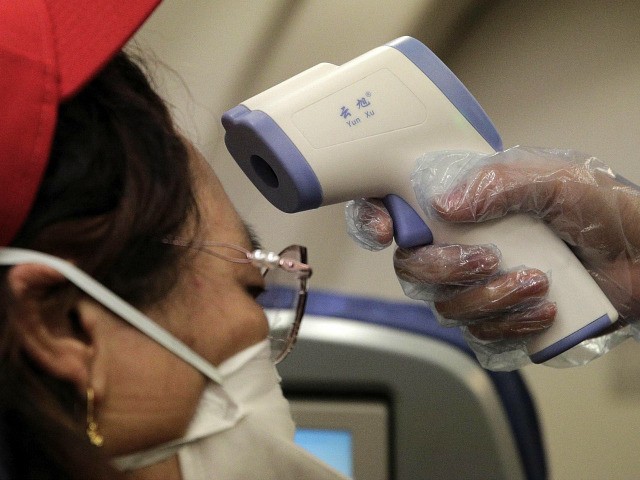Uyghur activists say the situation their oppressed people face in China’s Xinjiang province is even worse than previously believed, with hunger sweeping the area and medicine shortages caused by the coronavirus lockdown.
The Hong Kong Free Press wrote on Thursday that the infamous viral video of a Uyghur man pleading for help — or, failing that, begging for death — because his family is starving was only the tip of the iceberg:
Draconian measures by China to curb the coronavirus have caused widespread hunger in the tightly controlled Muslim-majority region of Xinjiang, ethnic Uighur activists charged Wednesday.
The Uighur Human Rights Project (UHRP), a Washington-based advocacy group, also voiced concern that the COVID-19 could spread in internationally condemned camps where more than one million Uighurs and other Turkic Muslims are incarcerated.
The group said that China imposed a quarantine with little advance notice in parts of Xinjiang in late January after at least two COVID-19 cases in the regional capital Urumqi.
Citing videos, photos and residents’ conversations with members of the Uighur diaspora, the group said that “many” people have gone short on food, medicine or other critical supplies as they have been ordered to stay inside their homes.
The UHRP released a video documenting their findings, testifying that everything depicted in the briefing is accurate and the evidence was smuggled out of Xinjiang at great risk to all involved:
NEW BRIEFING RELEASE:
The UHRP has released it's new Briefing, Local Residents in Danger of Starving in East Turkistan.
Below are verified videos of Uyghurs in the region who have gone without access to food or medical care.
Read the full Briefing here: https://t.co/KUCwoNemwE pic.twitter.com/AId8u4NbHD
— Uyghur Human Rights Project (@UyghurProject) February 26, 2020
The plight of Xinjiang residents is said to be especially grim because the lockdown was imposed swiftly and without warning, leaving them no time to stockpile food and supplies.
Radio Free Asia (RFA) on Wednesday reported that Uyghurs who disobey Xinjiang’s harsh quarantine protocols risk getting sent to the huge concentration camps Beijing established to “re-educate” them — camps that are viewed as a massive risk for coronavirus incubation by nervous world health officials.
At least one Uyghur with serious health issues unrelated to the coronavirus is said to be terrified of seeking treatment because he fears being sent back to the camps where he was once imprisoned:
A Communist Party cadre [official] in Peyziwat’s Shaptul township told RFA on Feb. 17 that area roads had been closed off and local officials have been too busy to bring supplies to families confined to their homes as part of the quarantine there, which went into effect on Jan. 23.
The cadre, who spoke to RFA on condition of anonymity, said that a Uyghur former detainee from the area named Abliz Niyaz was facing serious health problems because authorities had been unable to bring him medicine to treat a growth on his neck, and that he dare not leave his house to seek treatment because he feared being sent back to the camps for breaking quarantine.
Niyaz, a farmer in his mid-40s, had served a 10-and-a-half year sentence in a prison in nearby Yarkand (Shache) county, and later was detained in an internment camp in Peyziwat “for being a former convict,” the cadre said.
After 30 months in the camp, he was released in November to seek medical care for an undisclosed illness, she added.
“Two different growths showed up around his neck and they had to operate on him,” the cadre said.
“They took him to the [county] hospital … directly [from the camp] … because he was sick.”
The cadre said that ever since the roads were closed off in Shaptul, “it’s become very inconvenient,” and confirmed that, as of Feb. 17, Niyaz had been unable to get medicine for at least one week and treatment for at least 25 days.
The Communist official who spoke to RFA confirmed that Xinjiang residents have been told they will be sent to the concentration camps if they violate quarantine orders. A different Communist official dismissed the people complaining about a lack of food as “ill-intentioned” saboteurs who are “blowing things out of proportion” in a bid to undermine confidence in the Party.
Middle East Monitor noted on Thursday that Beijing has been pressuring governments looking to do lucrative business with China to arrest Uyghurs living abroad and return them to Xinjiang, where they are frequently sent to prison or simply disappear.
Uyghur expatriates have been highly vocal in criticizing China’s response to the coronavirus and have urged the international community to pressure Beijing into sending more food and medicine to Xinjiang. Survivors of the camps say they have already been swept by outbreaks of other diseases like tuberculosis.
The Chinese government responded by dismissing these complaints as a scheme to “slander China’s policies” and insisting the Xinjiang camps are actually “vocational training centers” from which most of the live-in students have graduated, so the risk of the coronavirus running wild in the camps is low.

COMMENTS
Please let us know if you're having issues with commenting.